#socialist appeal
Text
From the outset of the latest Israel-Palestine conflict, the capitalist media in Britain and USA has acted as an obedient mouthpiece for the establishment, echoing their imperialist propaganda. We need to build a voice for the exploited and oppressed.
#communism#marxism#revolution#free gaza#gaza#palestine#free palestine#press#workers rights#worker solidarity#worker press#israel#media#socialist#socialist appeal#communist#socialism#marxist theory
75 notes
·
View notes
Text
realized i should probably post about this on here: don't join the international marxist tendency (socialist fightback in canada, socialist appeal in the UK, socialist revolution in the US). they're currently engaging in a mass campaign of harassment and slander against my partner for speaking out about the abuse that them, myself, and others all experienced within the org. you can read about what happened to us in their statement (cw for sexual assault & harassment, domestic violence, transphobia)
since speaking out we've been reached out to by at least a dozen more people who experienced abuse within the org. there are known sexual abusers in the org who are in leadership positions and who are being protected by the rest of leadership. it is not safe for women and trans people.
#IMT#international marxist tendency#fightback#socialist fightback#socialist appeal#socialist revolution#marxism#socialism
31 notes
·
View notes
Text
From 17-19 March, hundreds of comrades from Socialist Appeal (British section of the International Marxist Tendency) met for this year’s national conference. The mood was one of optimism, enthusiasm, and dedication, with a laser focus on the task ahead: to build the forces of Marxism in Britain and beyond.
Last weekend, around 400 revolutionary activists from across the country gathered in London for the Socialist Appeal 2023 national congress.
The atmosphere at the event was electric from beginning to end. With the crisis deepening by the day globally, and the class struggle in Britain heating up, there was no shortage of material for the discussions.
Comrades also attended in person from Austria, Canada, France, Ireland, Poland, Sweden, and the USA, demonstrating the tremendous breadth of the International Marxist Tendency (IMT), which is growing across the world.
#Socialist appeal#Britain#March#British#Marxist#International Marxist tendency#Marxism#London#Austria#Canada#France#Ireland#Poland#Sweden#Usa#Imt#Growing
3 notes
·
View notes
Text
NURSES AND CARING PEOPLE OF THE WORLD UNITE!

When nurses across the United Kingdom went on strike on December 15 and 20, 2022, their actions resonated well beyond the UK, and nurses from different countries expressed their support. Among them were 125 nurses from Portugal who published an open letter in solidarity with their British comrades, reminding readers and patients that their own public health system faces many of the problems troubling the UK’s National Health Service.
Mário André Macedo, a specialist nurse and one of the first signatories of the letter, told People’s Health Dispatch that their initiative was inspired by both solidarity and a pressing need to point out the shortcomings that could bring the Portuguese public health service to its knees. In fact, the health system in Portugal shares a lot of similarities with the NHS, being itself inspired by the Beveridge model introduced in the UK.
The health system in Portugal, just like the NHS, has been an object of interest for the private sector for a very long time. In both cases, the goal of the private providers is to break down the systems, privatize the profitable parts, and leave what remains to a shrunken public budget. The main losers in this scenario are, of course, the poor and the working class, who have no alternative but to seek care in the public sector, no matter its state.
According to Macedo, “As health workers, we should protect the universal character of our health system. And since nurses are the most numerous group inside this system, we have the opportunity to make a particular impact.” The nurses’ intention is to push for change at the local level, but also to build stronger relations with their counterparts in other countries. “We can only win if we stand in solidarity and learn from each other.” concludes Macedo.
youtube
Sopiko Japaridze, a trade unionist and health activist from Georgia, has experienced healthcare in both Soviet Georgia and under the current government. She has also spent a significant part of her life in the United States. Japaridze, a member of the Solidarity Network in Georgia and a part of the People’s Health Movement, compares and contrasts her experience with these three different healthcare models.
#NHS#portugal#enough is enough#manchester#london#scotland#health care#nurses#rmt#mick lynch#trade unions#working class#socialist appeal#the morning star#labour party#nhs england#student nurse#solidarity#uk#social justice
3 notes
·
View notes
Text
"why don't you believe a jewish state has a right to exist!?" well actually i don't believe any state should exist !

#this is mostly a joke#but not rlly#but also yes#but no#i'm a socialist leaning on communism#but every day anarchism appeals to me greatly.................#i needa read up on some stuff
101 notes
·
View notes
Text
Progressive Liberalism is a very nice idea but is simply missing the huevos to call for the constitutionally uncontested single-party rule that would be necessary to actually implement it's advertised goals
#one thing u can say for places like singapore is they barely wear that mask#the mask is a formality for PAP rly#note on terminology - PAP being progressive liberals doesnt mean theyre 'good'#its just like how they justify their rule. all representative political parties need some measure of 'progress' for their base#progressive liberalism here meaning roughly appealing to workers on primarily economic issues#doesnt mean theyre great on that but in comparison to most capitalist economies in the area 🤷♂️#but id say singapore is probably objectively closer to being socialist in structure than like. sweden#which is again - a low bar#& the class character of PAP isnt proletarian afaict so its rly like a progressive bonapartist regime#'regime' here being used morally neutrally#also obv a lot of historical & geographic contingency that makes singapore not like immediately replicable#also relations to malaysia & malay-chinese communists etc etc#also!#doesnt mean PAP are 'leftist'!#none of these terms are meant in moral terms#bonapartist regimes tend to be ideological pastiches deeply tinted by the personal predisposition of the founder & class forces at the time
32 notes
·
View notes
Text
do you ever just hear the most batshit insane opinion from supposedly informative and educational sources

#okay guys... are you ready?#supposedly the right wing isn't actually gaining ground in europe because... those guys aren't really right wing!#la pen... meloni... they might be called neonazis but really... they're also trying to appeal to working people!#and promise to do all kinds of social stuff almost as if some...#national socialist party!#what a novel idea!#like jesus fucking christ how is this content allowed#i refuse to believe that it was made out of ignorance in which case... what kind of neoliberal nazi propaganda is this
3 notes
·
View notes
Text
hot take but using specific and less-popular definitions of common words alienates potential comrades and is bad, actually
I still stand by distinguishing the ownership of a factory/warehouse/whatever and ownership of your house or phone or whatever, but phrases like "abolish private property" constantly get misinterpreted because of popular definitions
#daemon.md#politics#leftists#socialists#socialism#communism#communist#anarchist#anarchists#anarchy#anarchism#I'm not saying we should sanitise ourselves to appeal to liberals#I'm saying we could avoid rehashing 'who will build the roads' 'so people can steal my toothbrush?' and 'but how will anything get made?'#and other such arguments that are entirely based on a misunderstanding of terminology
5 notes
·
View notes
Text
Around the world, workers and youth have been mobilising in solidarity with the Palestinian masses, who are facing a brutal onslaught from the Israeli military. Comrades of the International Marxist Tendency (IMT) have joined these demonstrations, advancing communist slogans in support of the struggle of the oppressed people of Palestine.
#communism#marxism#revolution#free gaza#free palestine#gaza#palestine#palestine action#palestine protest#protest#manifestation#palestine solidarity#palestine support#communist#International Marxist Tendency#imt#socialist appeal#socialist revolution
24 notes
·
View notes
Text
(neo)liberals love to point at the atrocities committed by systems that were communist only in name (and usually a stalinist bureaucratic dictatorship instead), but then gloss over the fact that capitalism caused the literal holocaust
#like they called themselves national socialists entirely to appeal to the socialist base among the petty bourgeoisie at the time#which was very big at that point#and because they wanted to disown jewish bankers. but only jewish bankers.#in reality hitler and the NSDAP were funded by bigwig corporations to destroy the working class#which they succeeded at. nazi germany almost entirely destroyed socialist movements in Germany#their actual system was capitalism in its most unbridled form. almost libertarian if libertarians also wanted to wage war.#this is further proven by the fact that they were not popular with the working class at the time like at all#their voting base was almost entirely the petty bourgeoisie which was far far bigger back then than it is today. also peasants#and ofc the actual bourgeoisie loved them too#but the working class hated them for the most part. hence the NSDAP never actually won an election.#or at least not as hard as they wanted to. even after all the terror they caused they still couldn't get the 2/3rds hurdle
1 note
·
View note
Text
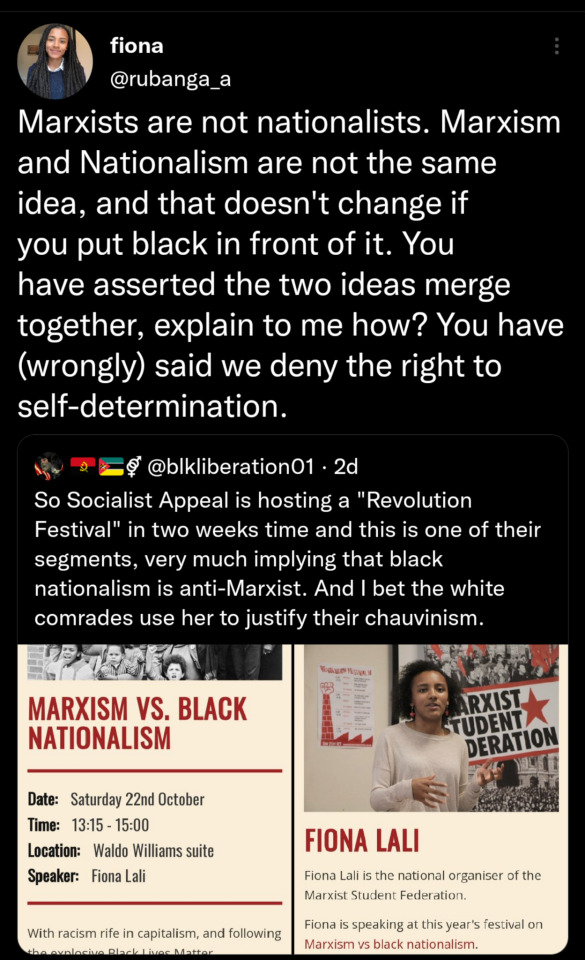

#Twitter#Fiona#Marxists#Nationalism#Self determination#Socialist appeal#Revolution festival#Marxist#Chauvinism#Gateway#Secede#Socialism#Uk#Revfest 2022
3 notes
·
View notes
Text
Talking about a revolution? Exploring Socialist perspectives on Iraq

In the article Communism and the Iraqi Revolution, Benjamin Curry of the UK based Socialist Appeal (British section of the International Marxist Tendency) goes to the roots of the revolutionary history of the Iraqi people.
According to Benjamin Curry, the 2003 US/UK invasion of Iraq and the liquidation of the Ba’athist state, “opened a Pandora’s Box in Iraq” but “for a time in the late 1950’s and early 1960’s Iraq became the key theatre of struggle in one of the most significant dramas in modern history.”
Estimates suggest more than a million people were killed in the 2003 invasion and subsequent occupation of Iraq and as Benjamin Curry argues: “The conditions in Iraq today cry out for the socialist reorganisation of society. The contradictions will permit no other solution.”
#Iraq20#iraq#iraqi#baghdad#basra#manchester#mosul#politics#socialism#socialist appeal#international marxist tendency#benjamin curry#history#iraq protests#iraqi communist party#labour party#jeremy corbyn#protest#ussr history#The Cold War
2 notes
·
View notes
Note
why do zionists always assume its antisemitic to think that zionism a settler colonial idea
Modern Zionists aren't actually well-read into their own history. I could invoke the likes of Theodore Herlz, Ze'ev Jabotinsky, David Ben Gurion, and many other political Zionists and how they were ardent supporters of settler colonialism, yet it wouldn't get through their head, because they genuinely believe the land of Palestine is their right to claim, despite the people inhabitating the area. But to claim that the establishment of the Settler state was necessary due to antisemitism is not correct.
The pogrom of the Jewish people in the Pale of Settlement in Imperial Russia resulted in the mass displacement of Jews. But most Jews did not flee to Palestine, but to the US and Western Europe to live relatively better lives, due to the French revolution and so on. They had no desire whatsoever to move to Palestine due to its harsh climate and environment. Although the repression of Jews in the 19th century added to Zionism's appeal, Zionism did not emerge because of it as is often portrayed.
Jewish historian Michael Stanislawiski explains:
The first expression of this new ideology were published well before the spread of the new anti-semitic ideology and before the pogroms of the ealy 1880s. The fundamental cause of the emergence of modern Jewish nationalism was the rise, on the part of Jews themselves, of new ideologies that applied the basic tenets of modern nationalism to the Jews, and not a response to persecution.
-- Zionism, a short introduction (Stanislawski, 2017)
As was the case for that time, the doctrine of nationalism became prevalent across Europe. Many versions of it gained hold of European intellectuals and the upper-classes. One of these were ethnonationalism, which emphasised common ancestry. Such a view was popular among Germans, Hungarians, Russians, Poles and etc, who saw their "tribes" as being distinct, and therefore needed to be preserved from foreign threats. Zionism would mirror some of these aspects, which was prevalent in Eastern Europe. The founding father of Revisionist Zionism (and the precursor to the Likud party), Ze'ev Jabotinsky stated:
"The creation of a Jewish majority, was the fundamental aim of Zionism, the term "Jewish State", means a Jewish majority and Palestine will become a Jewish country at the moment when it has a Jewish majority".
-- Zionism, and the Arabs, 1882-1948 A study of ideology (Yosef Gorny, 1987)
However, there was another ideology emerging which was far more popular among the oppressed Jewish people, which would propell them to emancipate themselves where they lived. Revolutionary Socialism.
According Ilan Pappe, the doctrine of Zionism was vehemently opposed by Jewish leaders all around Europe on the basis of Talmudic violations, the rise of revolutionary socialism and the rise of Jewish assimilationism. Additionally, in a conference in Frankfurt, rabbis decided to omit the mentioning of "the return" from Jewish prayers as a reaction to Zionism. However, Zionism would face intense opposition from Socialist Jews, especially the Bundists, who openly declared Zionism to be anti-Socialist, opportunistic and reactionary. Zionism was an alien idea, and revolutionary socialism emphasised the importance of the liberation of Jews where they lived, resulting in an ideological feud between the Bundists and Political Zionists. Even the likes of the Chaim Weizmann, the first president of the Settler state, and David Ben Gurion, the first PM of the settler state, would condemn the Bundists for their opposition to Political Zionism.
727 notes
·
View notes
Text
alp or die

#I really need to stop posting now#I’m happy for y’all greens voters#but I just cannot see the appeal#I’m democratic socialist first human second#(very much economically left leaning)
0 notes
Text
my hadestown conspiracy theory: so the major turning point in the orpheus and eurydice myth is when orpheus sings a song so beautiful that the underworld stops to listen, right? and in hadestown, epic iii is that song
except
there is a song during which 'no hammers swing/no pickaxe ring', and it's not epic iii. it's if it's true
instead of the love song, instead of the personal appeal to hades himself, the turning point in hadestown is orpheus reaching out to the workers and helping them see that they are people too. persephone seeing this leads to her confronting hades, which leads to him confronting orpheus. if it's true is the moment where everything in the underworld truly changes.
not the love song, but the socialist call to arms
and i love that
350 notes
·
View notes
Text

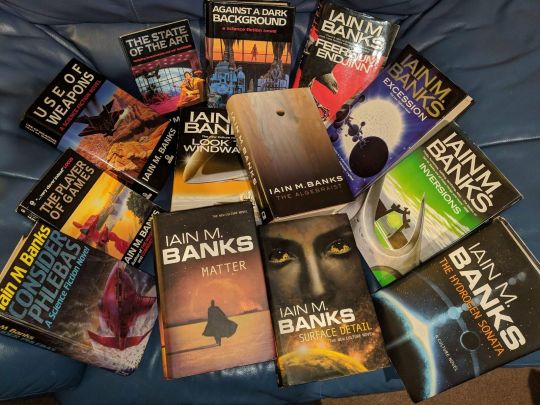
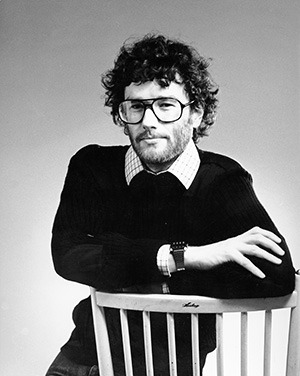
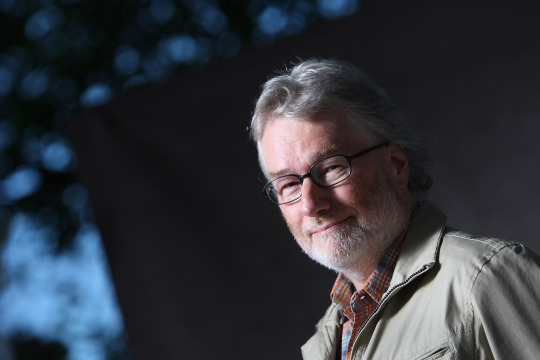
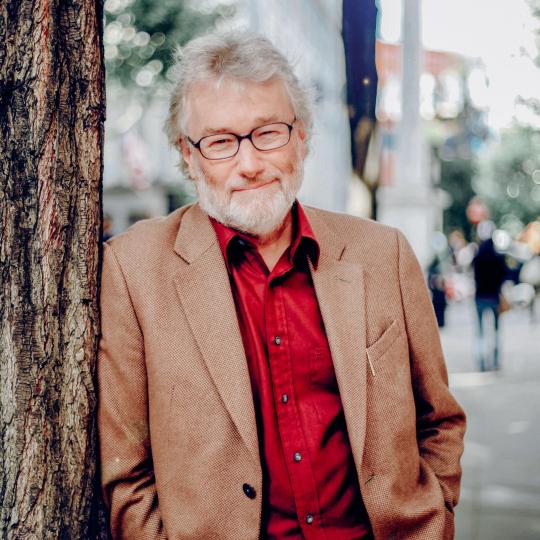

On February 16th 1954 the writer Iain Banks was born in Dunfermline, Fife
Banks was a son of a professional ice skater and an Admiralty officer. He spent his early years in North Queensferry and later moved to Gourock because of his father’s work requirement. He received his early education from Gourock and Greenock High Schools and at the young age of eleven, he decided to pursue a career in writing. He penned his first novel, titled The Hungarian Lift-Jet, in his adolescence. He was then enrolled at the University of Stirling where he studied English, philosophy and psychology. During his freshman year, he wrote his second novel, TTR.
Subsequent to attaining his bachelor degree, Banks worked a succession of jobs that allowed him some free time to write. The assortment of employments supported him financially throughout his twenties. He even managed to travel through Europe, North America and Scandinavia during which he was employed as an analyzer for IBM, a technician and a costing clerk in a London law firm. At the age of thirty he finally had his big break as he published his debut novel, The Wasp Factory, in 1984, henceforth he embraced full-time writing. It is considered to be one of the most inspiring teenage novels. The instant success of the book restored his confidence as a writer and that’s when he took up science fiction writing.
In 1987, he published his first sci-fi novel, Consider Phlebas which is a space opera. The title is inspired by one of the lines in T.S Eliot’s classic poem, The Waste Land. The novel is set in a fictional interstellar anarchist-socialist utopian society, named the Culture. The focus of the book is the ongoing war between Culture and Idiran Empire which the author manifests through the microcosm conflicts. The protagonist, Bora Horza Gobuchul, unlike other stereotypical heroes is portrayed as a morally ambiguous individual, who appeals to the readers. Additionally, the grand scenery and use of variety of literary devices add up to the extremely well reception of the book. Its sequel, The Player of Games, came out the very next year which paved way for other seven volumes in The Culture series.
Besides the Culture series, Banks wrote several stand-alone novels. Some of them were adapted for television, radio and theatre. BBC television adapted his novel, The Crow Road (1992), and BBC Radio 4 broadcasted Espedair Street. The literary influences on his works include Isaac Asimov, Dan Simmons, Arthur C. Clarke, and M. John Harrison. He was featured in a television documentary, The Strange Worlds of Iain Banks South Bank Show, which discussed his literary writings. In 2003, he published a non-fiction book, Raw Spirit, which is a travelogue of Scotland. Banks last novel, titled The Quarry, appeared posthumously. He also penned a collection of poetry but could not publish it in his lifetime. It is expected to be released in 2015. He was awarded multitude of titles and accolades in honour of his contribution to literature. Some of these accolades include British Science Fiction Association Award, Arthur C. Clarke Award, Locus Poll Award, Prometheus Award and Hugo Award.
Iain Banks was diagnosed with terminal cancer of the gallbladder and died at the age of 59 in the summer of 2013.
316 notes
·
View notes